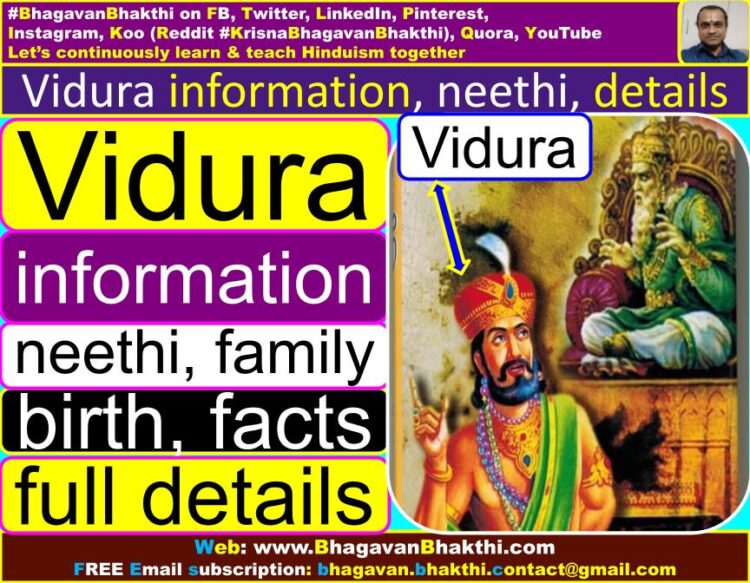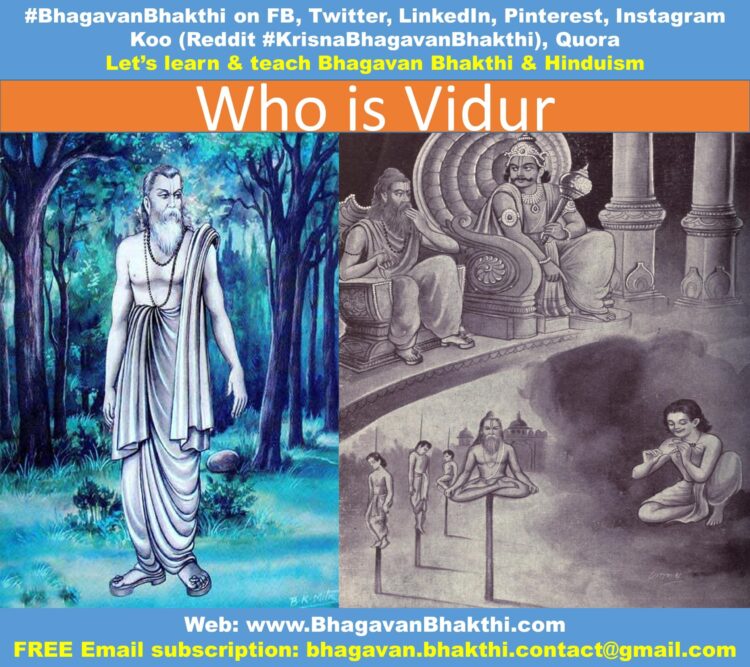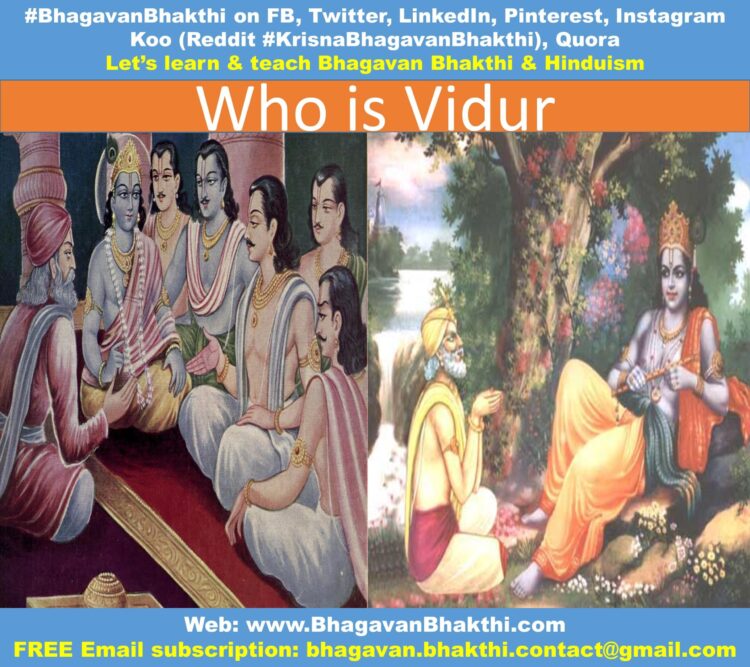Vidura information, neethi (statecraft), family, Mahabharata, birth, full details
Namaste friends, how are you doing today? Welcome to #BhagavanBhakthi website / blog.
Bhagavan Lord Sri Vishnu (Krishna) (Rama) blessings to you and your family!
In this website / blog, you will always learn about #Hinduism #Sanskrit language.
Also subscribe to my YouTube channel from this link #BhagavanBhakthi to view videos about #Hinduism #Sanskrit language.
Just before going to “Vidura information, Vidura neethi (niti) (statecraft), family, Mahabharata, birth, full details“, let us have some brief information.

Vidura parents : Vedavyasa (Father), Parishrami (Mother) – Through Niyoga.
Vidura brothers : Dhritarashtra (from Ambika), Pandu (from Ambalika).
Vidura wife name : Sulabha.
Vidura children names : Anasava (son) and Anuketu (son), Ambavati (daughter).
Information about birth of Vidura, an avatar of Lord Sri Yama Deva is as given below:
There is an interesting background about the birth of Vidur, an avatar of Lord Sri Yama Deva.
Earlier, Sage Animandavya was performing penance to attain the stature of Maharshi Vashishtha.
A group of thieves who had stolen royal property were being chased by the servants of the king.
They left the property at the ashrama / hermitage of Animandavya and ran away.
The servants of the king arrested Animandavya and put him on the hanging pole (sooli / see below image).
He continued his tapas / penance sitting in that position itself. The king released him.

Left: Vidur. Right: People on the sooli
He went to Lord Sri Yama Deva and asked him why he was made a victim of such a punishment.
Lord Sri Yama Deva told him that he had pierced a fly when he was a boy, and this was the punishment for that.
The real reason was that he was trying to attain the stature of Maharishi Vashishtha, which was beyond his capacity.
[We should always remember that we should not try to do more than our yogyata (capability / merit / qualification).]
[If we try to get more than what’s our capability is, then we would have to face shame and humiliation].
Animandavya was angry and cursed Lord Sri Yama Deva to be born as a Shudra (One of the four varna in Hinduism).
To know the correct meaning of four varna in Hinduism, visit the below given link:
What is four varna (Chatur varna) correct meaning in Hinduism
Consequently, Lord Sri Yama Deva was born as Vidura in Hastinapura.
Bhishma arranged the performance of Jatakarma (A divine ritual in Hinduism) and other Sanskars for Dhritarashtra, Pandu, and Vidura.
They were educated in the sacred literature, political science, and the wielding of weapons.
Dhritarashtra was coronated as king. Pandu was made the army chief.
Later, Dhritarashtra gave the throne to Pandu because Dhritarashatra was incapable of leading the kingdom because of his blindness.
Vidura was made Chief Minister.
The Gandharva named Tumburu was born as a son of Gavalgana, the charioteer of Vichitravirya, and was named Sanjaya.
The Maruta Vivaha was partially present in him as an amsha (Potion) (ansh).

Left: Vidura discussing with Bhagavan Sri Krishna and Pandavas. Right: Vidura praying to Bhagavan Sri Krishna
Information about ‘Vidura Niti’ (statecraft) is as given below:
1. He who is not served by the higher ends of life with the help of self-knowledge, perseverance, patience and constancy in virtue is called wise.
2. These again are the marks of a wise man, viz., clinging to deeds, praiseworthy and blameworthy, rejecting trust and respect.
3. He who is not moved away from the pinnacle of life by anger, joy, pride, false modesty, stupidity or arrogance is considered wise.
4. Those whose intended actions and proposed counsels are concealed from the enemy and known only after their actions are done, are considered wise.
5. One whose intended actions are never hindered by heat or cold, fear of attachment, prosperity or adversity is considered wise.
6. Whose judgment, detached from desire, pursues both virtue and gain, and who, disregarding pleasure, chooses such ends as may serve in both worlds, is considered wise.
7. Those who work according to their power and act according to their power and disregard nothing as insignificant are called wise.
8. He who understands quickly, listens patiently, pursues his objects not from desire, but from judgment, and does not spend his breath in the affairs of others without asking, is said to have the foremost sign of wisdom.
9. He who does not strive for unattainable things, who does not mourn for what is lost, who does not cloud his mind amid calamities, is considered to have a wise intellect.
10. He who starts any work and works hard till it is completed, who never wastes his time and keeps his soul under control is considered wise.
11. Always rejoice in honest deeds, do what tends to their happiness and prosperity, and never sneer at what is good.
12. He who does not rejoice in honor, who does not reduce greed, who is calm and serene like the lake of the Ganges, is considered wise.
13. A man who knows the nature of all beings, knows also the connections of all actions, and is adept in the knowledge of the instruments upon which men can rely, is considered wise.
14. One who speaks boldly, can speak on various subjects, knows the science of argument, has talent and can interpret the meaning written in books is considered wise.
15. He whose study is governed by discernment and whose reason follows the scriptures and never fails to pay respect to the best is called wise.
16. He who is ignorant of the scriptures is vain, he who is poor but proud, and he who resorts to unjust means to acquire his objectives is a fool.
17. He who forsakes his own, cares for the goods of others, and takes deceitful means in the service of his friends, is called a fool.
18. He who desires what is not to be desired and renounces what can be legitimately desired and who harbors malice towards the powerful is considered a foolish soul.
19. He who regards his enemy as his friend, who hates his friend and shows ill-will towards him and commits evil deeds, is said to be a man of foolish spirit.
20. He who discloses his plans, who doubts all things, and spends a long time doing what is needed for a short time, is a fool.
21. One who does not perform Shraaddha to the ancestors, doesn’t worships the deities nor acquires noble minded friends is said to be a person of foolish soul.
22. Bad men are fools who enter a place uninvited and talk too much without being asked and put their trust in incredible weight.
23. The most foolish of men is he who accuses others of his own guilt, and vents his anger when he is powerless.
24. What man, ignorant of his own strength, and averse both to virtue and profit, desires a thing difficult to acquire, again without adopting adequate means, is said to be unwise.
25. He who punishes those who do not deserve to be punished, who honors persons without their knowledge, and waits upon the miser, is said to be short-witted.
26. Having acquired immense wealth and prosperity, or acquired (immense) learning, who does not afflict himself with egoism, he is considered wise.
27. When an archer shoots an arrow, he may or may not succeed in killing even a person, but when a wise person applies his wisdom (in a bad way); It can destroy the entire kingdom along with the king.
28. A poison kills only one, and a weapon kills only one; However, evil advisors destroy the entire kingdom along with the king and the subjects.
29. One should not partake of any delicious food alone, nor reflect only on the cares of gain, nor go on a journey alone, nor keep awake among sleeping companions.
30. There is only one fault in a man who forgives, and no other; That error is that people take a forgiving person as weak.
31. However, that error should not be overlooked, because forgiveness is a great power. Forgiveness is the virtue of the weak and the jewel of the strong.
32. A fire falling on a grassless ground will extinguish itself. And the unforgiving person defiles himself with many immensities.
33. Righteousness is a supreme good; And forgiveness is a supreme peace; Knowledge is a supreme satisfaction; And benevolence is the only joy.
34. Just as a serpent eats animals that live in holes, so the earth eats these two, the king incapable of war and the Brahmin who does not dwell in holy places.
35. A man can gain fame in this world by doing two things, namely, by abstaining from harsh speech and by overlooking the wicked.
36. These two have not a will of their own, viz., those women who covet men simply because the latter are coveted by others of their sex and person who worships another simply because the latter is worshipped by others.
37. These two people are like sharp thorns afflicting the body, that is, the desires of a poor man, and the anger of the impotent.
38. These two persons never shine because of their incompatible functions, i.e. the housewife without effort and the beggar who is busy with projects.
39. These two dwell in a region higher than heaven, i.e., the powerful man who has forgiveness and the poor man who gives charity.
40. Among the things received honestly, these two are to be regarded as misuse i.e., giving gifts to the unworthy and denying to the worthy.
41. These two should be thrown into the water, with weights tied tightly around their necks, i.e., the rich man who does not give up and the poor man who is proud.
42. Both can pierce the orb of Surya, i.e. the mendicant skilled in yoga and the warrior who fell in open combat.
43. Persons versed in the Vedas have said that the means of men are good, moderate and bad.
44. Men are also good, indifferent and bad. Therefore, they should be appointed in suitable work order.
45. Theft of other’s property, violence against other’s wives and treachery with a friend are the three crimes that cause great fear.
Dhritarashtra and Gandhari
Dhritarashtra married Gandhari, the daughter of Gandhara King Subala. (In today’s time this place called Gandhara is called as Kandahar which is located in Afghanistan.)
As Gandhari’s husband was blind, Gandhari blindfolded her own eyes too.
Shakuni was Gandhari’s younger brother. He was the demon Dwapara (Dwapara Yuga’s Dwapara) born as Shakuni.
The word “Dwapara” means “a person who is always suspicious about truth and entertains contradictory ideas”.
Since men develop such a tendency during Dwapara Yuga, that age or Yuga is named as Dwapara (Dwapara Yuga).
More information will be added to this on regular basis, please visit after some time to know more information.
Know more about “Pandavas information“, by clicking the below link:
Check this link to know more about “Lord Krishna information“:
To watch videos on #Hinduism #Sanskrit language, SUBSCRIBE to my YouTube channel from this below link:
#BhagavanBhakthi YouTube channel
To know more about “Mahabharata information, facts, details, significance, importance, etc.“, kindly click the below link:
Mahabharata information, facts, details, significance, importance, etc.
To know more about “Sanatana Dharm (Hinduism)“, kindly click the below link:
Sanatana Dharma (Hinduism) information, facts, details, significance, importance, etc.
Dear friends, if you need any clarifications about this post, kindly let me know, I will definitely try to answer all of them.
Also your one LIKE, one COMMENT, One Share, one SUBSCRIPTION is highly important.
This will help to know the quality of this content and also it will be helpful to know if any improvements is required for the content.
If you feel this content is useful to you and has helped you to improve your knowledge, kindly share this with your well-wishers.
Because “SHARING MEANS CARING”.
To receive FREE EMAIL SUBSCRIPTION about #BhagavanBhakthi, you can send an email to bhagavan.bhakthi.contact@gmail.com from your email ID.
NAMASTE!
Sri Gurubhyo Namaha
Sri Krishnaaya Namaha
Sri Krishnaarpanamastu
Share in Social Media